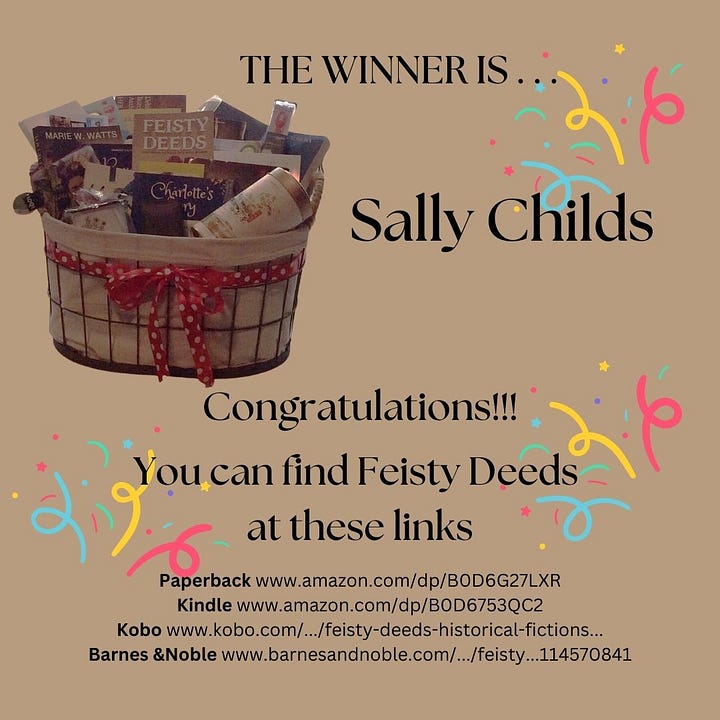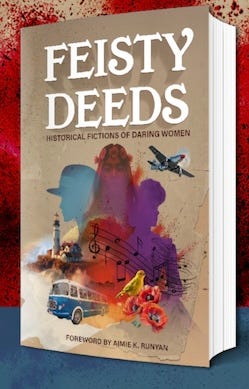Author Interview: Meet Elaine Aucoin Schroller
Feisty Deeds Anthology Author of 'Ripples in a Pond'
Elaine Aucoin Schroller was a history major and technical writer, but now she reads and writes historical fiction to travel far and wide to other places in time. She was a member of the editorial committee for Feisty Deeds: Historical Fictions of Daring Women. She became captivated by the stories of Americans and Australians, who worked beside each other in WWI France and WW2 Australia, and her books flowed from there. Elaine’s writing a trilogy with her characters, Sophie, an American, and Joe Parker, her Australian husband. Dare Not Tell, her debut novel, begins with Sophie and Joe's chance meeting in 1916 Paris and chronicles their relationship through thick and thin up to the threshold of WWII. The Bravest Soldiers, the next chapter in their story, is set in Australia and the South West Pacific Area during World War II. This book features Sophie and Joe, their sons Sam and Jean-Luc, Marianne Ryan, plus visitors from the US, a new romance, and a trio of children whom life has treated unfairly. And Elaine always includes a dog in her books. She is currently working on the third book in the series tentatively titled, North Star, Southern Cross. The book includes Sophie and Joe, as well as Marianne and Sam, and most of the rest of the Immense Sky Saga gang, plus a dog or two, of course. Elaine’s novels are available where books are sold. She likes to read, travel and play with her two rescue cocker spaniels.
Elaine’s short story, ‘Ripples in a Pond,’ is a companion piece to her novels. A chance encounter reawakens a former WW1 nurse’s emotional wounds. Her story takes place in London, England in 1939. While on her honeymoon with Joe, Sophie accepts an invitation to visit with former colleagues involved in creating the masks and rehabilitating disfigured soldiers injured in the war. At the exhibit she is forced to face the past, but someone reaches out a hand. “Ripples in a Pond’ is such a touching, haunting story of the ravages of war and the depth of the human spirit, along with the choices Sophie made that saved many lives. You can connect with Elaine via her website: https://elaineschroller.com/
Elaine’s Interview: ‘Ripples in a Pond’
1. How did this story come to you and how did you get the idea for your Feisty Female Character?
To be honest, I cheated on the idea for my Feisty Female Character since I didn’t have to create her out of nothing for ‘Ripples in a Pond.’
Sophie Holt Edwards Parker is my muse and a major character in my novels Dare Not Tell and The Bravest Soldiers. She was a nurse at the American Hospital in Paris during WWI. When the war ended, she married her first husband, an English surgeon who performed reconstructive surgery on soldiers who had suffered facial mutilation. In many cases however, surgery was not an option, and the men needed a way to re-enter society without being shunned or labeled monster. So-called “tin masks” were the answer.
I learned so much on the subject of facial wounds, reconstructive surgery, and masks during the course of writing Dare Not Tell, that I was compelled to explore the repercussions of caring for men facing these injuries on Sophie’s psyche.
2. What’s your writing process/routine?
Usually I write at night when the house is quiet and my husband and dogs are asleep. I must have an outline or I tend to write in circles.
3. What was the hardest part of writing this story?
Laser focusing in on Sophie’s war-related trauma to do it justice in only 3000 words. During the war and her first marriage, she had to tamp down her emotions so that she could effectively care for her patients knowing full well many of them would not survive or could not return to their pre-war lives. She’s the sort of person who forges forward and gets things accomplished and I needed her to completely lose sight of that and turn inward to acknowledge that she, too, had suffered.
4. How do you select your character’s names?
That’s both a tough and easy question. I always knew Sophie would be called Sophie – for no other reason than because I love that name. Joe’s name came from my two favorite fictional men: Joe Harmon in A Town Like Alice and Joe Bradley in Roman Holiday. For everyone else, both in my novels and in ‘Ripples in a Pond,’ I try to think of period- and nationality-specific names. Marianne Ryan, a major character in The Bravest Soldiers, is half-French, half-Australian, born in France before WWI ended. Her parents named her Marianne after the symbol of the Republic of France at a time when that notion continuing was in peril.
5. Describe your writing space.
It’s a mess! I claimed our loft as mine, but I share it with all the family paperwork. I need a bigger desk and one of those bulletin boards on wheels because I’ve run out of wall space for idea boards. But I also have a super comfortable armchair where I often fall asleep reading. The dogs like it, too, and sometimes I have to remind them it’s my chair, not theirs.
6. Do you only write only Historical Fiction or do you write other genres?
I only write historical fiction, although I sometimes wonder if it would be easier and faster to write contemporary fiction. Like most historical fiction writers, I spend an inordinate amount of time on research. I love that historical fiction allows me to write character-driven stories rather than the stricter plot-driven guidelines of genre fiction.
7. What question do you wish someone would ask you about yourself and/or your story and no one has?
Why do I write about Australians and Americans? People have asked that question, but I rarely have the chance to answer it fully. I write about them because of a television program. Seriously.
The first glimmers of inspiration came from episodes of Miss Fisher’s Murder Mysteries, an Australian TV series set in 1929. The lady private investigator was an ambulance driver for the Belgians in WWI. All of the supporting male characters fought in WWI. The detective and his constable happen upon a crate containing ammunition for Browning automatic rifles – the first machine guns – made by the Americans during WWI.
Despite being a History major in college, I had only a fuzzy knowledge of US participation in WWI, and no idea the Australians fought in WWI. I started down the proverbial research rabbit hole and discovered Americans and Australians have a long history together.
The first time Americans ever fought in WWI was with the Australians at the Battle of Hamel on July 4, 1917. The battle lasted 93 minutes and the Germans were defeated.
Then, during WWII, when Australia stood alone against the onslaught of the Japanese in the Pacific, Pearl Harbor was bombed and hundreds of thousands of American personnel were sent to Australia to be trained to fight the Japanese, to recover from fighting, and to generally vex the locals in much the same way they did in England: “the Yanks were overpaid, oversexed, and over here.” Then-Lieutenant John F. Kennedy recovered in Australia after his PT-109 was sunk. Over ten thousand young Australian women married American servicemen and emigrated to the United States.
There’s more, and I could go on for hours, but I’ll end with this: With all that history together, how could I not write about Australians and Americans?
I’d love to hear your thoughts on Elaine’s interview and her story, especially if you’ve read Feisty Deeds: Historical Fictions of Daring Women. We would love a review on Amazon or Goodreads if you’ve read the book. It’s available for purchase on Amazon, BookBub, Kobo, and Barnes&Nobles.








I love how much I learn about our fellow Hist Fic writers in these interviews. Thanks, Patty! (And Elaine, of course!)
I love these insights into the story!